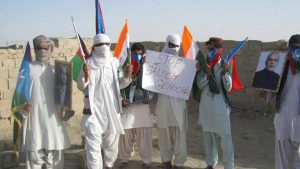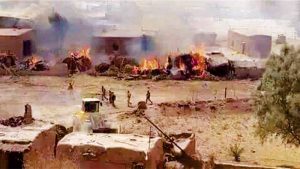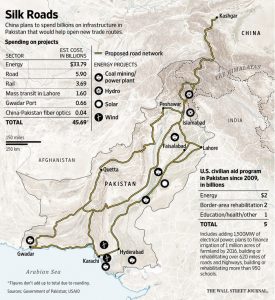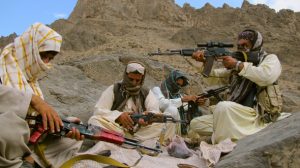Editor’s Note: From our great friend Dr. Lawrence Sellin, Phd. Dr. Sellin is also a retired colonel with 29 years of service in the US Army Reserve and a veteran of Afghanistan and Iraq.
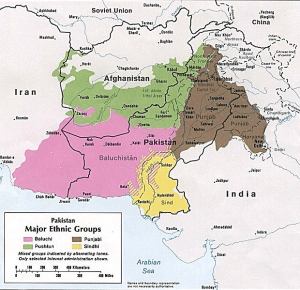
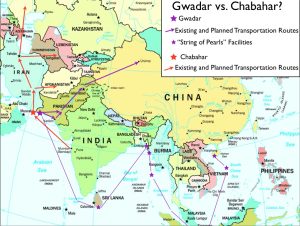
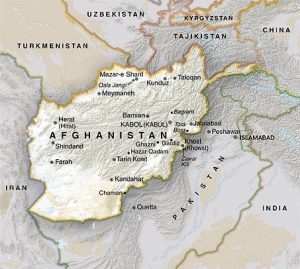
Pakistan sees no role for the U.S. in the future of Afghanistan
by Lawrence Sellin, Phd. May 27, 2017
If you want to understand the foreign policy of Pakistan, look to the Pakistani military. If you want to understand the views of the Pakistani military, look to the Inter-Services Intelligence (ISI) and its new chief, Lieutenant General Naveed Mukhtar.
Mukhtar commanded a mechanized army division and has vast experience in intelligence having led the ISI counterintelligence division and he is believed to have led secret missions against the Tehreek-e-Taliban Pakistan (TTP) and the Balochistan Liberation Army (BLA).
A graduate of Pakistan’s Command and Staff College in Quetta and the National Defense University in Islamabad, Mukhtar also attended the U.S. Army War College, where he wrote a thesis entitled “Afghanistan — Alternative futures and their implications.”
In it, Mukhtar outlines four different scenarios for the future of Afghanistan, all involve U.S. and NATO withdrawal from Afghanistan and the installation of some form of Taliban government controlled by Pakistan. He does not see the U.S. or its allies ever reentering Afghanistan.
According to Mukhtar, Afghanistan’s stakeholders are its “six immediate neighbors (China, Iran, Pakistan, Uzbekistan, Tajikistan, and Turkmenistan) and its regional partners (Russia, India, and Saudi Arabia).” The future U.S. role in Afghanistan is relegated to diplomacy, where “America would have to make aggressive diplomatic efforts to dissuade provocative action or intervention by regional players,” meaning preventing Indian influence in Afghanistan.
Not to put too fine a point on it, Mukhtar is proposing the status quo ante, a form of the pre-9/11, Taliban-governed, Pakistan-controlled Afghanistan.
It is ironic that Mukhtar writes “A major characteristic of all the scenarios is the prevention of the return of al Qaeda to Afghanistan, while ensuring terrorism can no longer be exported outside of its borders,” when even today Pakistan is unable to control terrorist groups inside its borders and facilitates or turns a blind eye to international terrorist operations launched from Pakistan.
For a long time, Pakistan has used religious militancy as a foreign policy tool and, domestically, either supporting or attacking religious militant groups to exert political control or suppress autonomy or nationalism among its disaffected minorities.
Pakistan has openly admitted supporting and training groups like the Taliban in Afghanistan and Lashkar-e-Taiba, a Salafist organization with links to the ISI, which conducted terrorist operations in Kashmir and reportedly was responsible for the horrific attack in Mumbai, India in November 2008. In conjunction with army operations, the Pakistan government has been accused of motivating terrorist groups like Lashkar-e-Taiba to suppress the Balochistan independence movement.
The U.S. cannot win in Afghanistan unless there is a significant change in the strategic environment because Pakistan, through its support of the Taliban, regulates the operational tempo of the conflict and the supplies essential to sustain our troops in Afghanistan transit Pakistani territory.
So, what are U.S. options in Afghanistan?
We could repeat, more or less, the same strategy and tactics that we have employed over the last sixteen years and expect different results.
We could decide that Afghanistan is no longer worth the blood and treasure, withdraw and cede regional influence and problem ownership to Pakistan, China and Iran, letting the chips fall where they may.
Or we could begin to take steps to alter the strategic dynamics of the region creating incentives for Pakistani cooperation including cutting off foreign aid, declaring Pakistan a state sponsor of terrorism, tilting towards India and supporting Balochistan independence.
The success of the emerging China-Pakistan Economic Corridor depends on the stability of Balochistan because it provides a major section of the transportation route from China to the deep water port in Gwadar on the Arabian Sea.
Pakistan has directly contributed to the instability in Afghanistan and unnecessarily prolonged the war. Islamabad would do well to remember that insurgency is not a one-way street.
